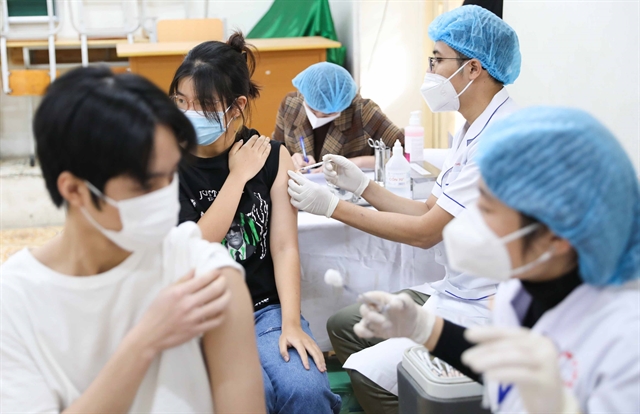 Society
Society


|
| High school students in Hà Nội inoculated against COVID-19. — VNA/VNS Photo Thanh Tùng |
HÀ NỘI — School principals and experts have welcomed the return of in-person learning as schools in Hà Nội prepare for a limited reopening.
Secretary of Hà Nội's Party Committee Đinh Tiến Dũng announced earlier this week that the city is preparing to resume in-person classes for high school students in low and medium-risk areas from this month.
The plan is expected to be implemented between December 6 and 12.
Taking into consideration the complicated developments of the pandemic in the capital city, Dũng said: “It is a must to be well-prepared in allowing children to return to school, ensuring requirements are met and students’ health is the top priority”.
He also noted that teachers who are not fully vaccinated are only allowed to teach online, and that students must bring their own water and in-person classes only take place either in the morning or in the afternoon, not the whole day.
The news has been well-received by local school leaders.
According to Lê Xuân Trung, Principal of Lê Lợi High School (Hà Đông District, Hà Nội), schools are ready to welcome students back after months of online learning.
He said his school has been working to meet safety standards, ensuring teachers are fully vaccinated and the school medical room is well-stocked, with plans for quarantine rooms and welcoming students in batches.
As the school allows city-wide enrolment, students in low and medium risk areas will come back to the campus, while those at higher risk localities will continue learning online until the outbreak is controlled.
The pupils returning to school later will be provided with free tutoring classes to ensure fair learning for all students.
“There are only three weeks left until the end of the first semester. Exams are expected to take place in the last weeks of December, so now is a crucial time to return to school, for students to revise lessons with their teachers before the exams”, said Trung.
Principal of Phan Huy Chú High School (Đống Đa District, Hà Nội) said that despite being closed for several months now, its classrooms and function rooms have been well-maintained and are ready to welcome students back when the situation allows.
Việt Đức High School (Hoàn Kiếm District, Hà Nội) will also develop a hybrid teaching plan, said the school principal Nguyễn Bội Quỳnh.
“For the first-semester final exams, the school has prepared for both scenarios, allowing students to take the tests in-person, though we can switch back to online should problems arise”, said Quỳnh, “We won't be passive no matter the situation”.
Regarding this matter, Đỗ Văn Dũng, Head of the Public Health Department at Hồ Chí Minh City University of Medicine and Pharmacy, said now is a suitable time to reopen schools in the locality.
According to Dũng, there are now two signs that make going back to school suitable and necessary.
“The first sign is that the number of new COVID-19 cases has decreased to about 70 to 100 new infections in every 100,000 people per week. This is an improvement compared to the past, and the pandemic situation is more stabilised”.
“The second is a majority of the population, especially parents and students, are vaccinated”, he continued. “Thus the infection risk for students is lower and does not pose a risk to the community”.
He also mentioned that according to a study by UNICEF, students’ learning efficiency in online classes is only around 30 to 40 per cent in comparison to in-person classes.
Reopening schools however will depend on the situation at each locality, Dũng noted. The southern Kiên Giang and An Giang provinces, where the infection rate is on the rise and the vaccination rate remains low, might have to wait a little longer.
Meanwhile, localities with a modest vaccination rate but with no rise in infection rates, can send students back to school.
Commenting on shutting down an entire school when a new infection is detected, Dũng said: “Closing schools or any other venues is necessary when there is an outbreak.”
“However, closing the entire school is not an optimal solution when there is no proof that the location in question is highly infectious”, he said.
“The most important thing is to practise the 5K measures, and ensuring students stay in their respective classes.”
Education is of the utmost importance. The first years of learning form foundations and habits, which are difficult to compensate for if the time has already passed, Dũng said. — VNS




